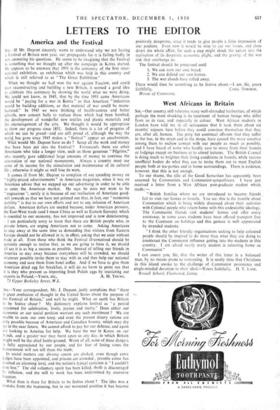Sig, —Your correspondent, Mr. J. Dupont, justly complains that "
there is great confusion of thought in the United States about the purpose of the Festival of Britain," and well he might. What on earth has Britain to be festive about ? My dictionary explains festival as " a' period appointed for celebration, lively, joyous and merry." Does either our economic or our social position warrant any such merriment ? We are unable to earn our own keep, and even the present dreary rations are only possible because of American and Canadian bounty, which may dry up in the near future. We cannot afford to pay for our defence, and again are looking to America for help. We have the war in Korea on our hands, and a greater warmay burst upon us any day, in which Britain might well be the chief battle-ground. Worst of all, none of these dangers is fully appreciated by our people, and for fear of losing votes, the Government will not tell them the truth.
In social matters our divorce courts are choked, even though extra judges have been appointed, and prisons are crowded , juvenile crime has reached an alarming level, and the nation's typical cynicism is " I couldn't care less." The-old voluntary spirit has been killed, thrift is discouraged by inflation, and the will to work has been undermined by excessive taxation.
What then is there for Britain to be festive about ? The idea was a mistake from the beginning, but in our worsened positiOn it has become positively dangerous, since it tends to give people a false impression of our position. Even now it would be wise to cut our losses, and close down the whole affair, for such a step might shock the nation into the realisation of its desperate economic plight, and the gravity of the war risk that overhangs us.
The festival should be postponed until 1. We can earn our own bread.
2. We can defend our own homes.
3. The war clouds have rolled away.
There would then be something to be festive about.—I am, Sir, yours






































 Previous page
Previous page